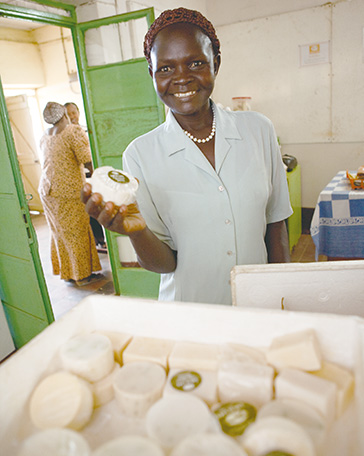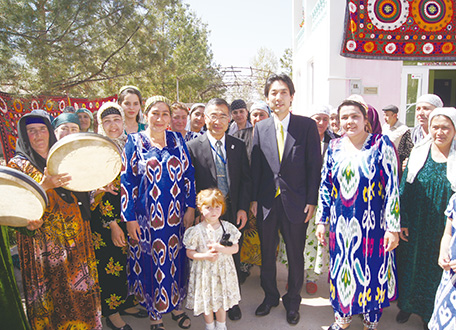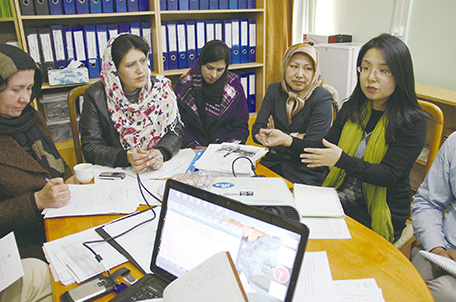Japan's Official Development Assistance White Paper 2013
(5) Gender
Much of the conventional wisdom and many of the social systems that exist in developing countries are generally formed from a male perspective, putting women in a number of vulnerable positions. Approximately 70% of the world’s poor are reportedly women. In order to achieve sustainable development, the promotion of gender equality and the improvement of the status of women are indispensable. Therefore, it is important for men and women to equally participate in development and to equally reap the benefits.

Shea butter products made by South Sudanese women. Soap and cream made from shea butter trees are popular cosmetics and skincare products in other countries, which contribute to improve South Sudanese women’s livelihood. (Photo: Shinichi Kuno / JICA)
<Japan’s Efforts>
When the ODA Charter was revised in 2003, Japan incorporated the perspective of gender equality and clarified efforts aimed at improving the status of women in developing countries. Furthermore, Japan’s Medium-Term Policy on Official Development Assistance defined gender perspective as a principle that should be applied to development efforts.
Recognizing women as important actors of development, Japan formulated the Initiative on Women In Development (WID) in 1995 to consider ways in which women could participate in every stage of development (development policy, project planning, implementation, monitoring, and evaluation). In 2005, the WID Initiative was fundamentally reviewed, and development issues stemming from the gender and roles of men and women in societies targeted for assistance were analyzed. This resulted in the formation of the Initiative on Gender and Development (GAD), which aims to realize sustainable and equitable societies.
In addition to the existing WID Initiative’s focus on the three important areas of women’s education, health, and participation in economic and social activities, the GAD Initiative brings a focus on the application of gender perspective to all areas and aims to improve the situation on gender equality, the vulnerable socio-economic circumstances in which women are placed, and the fixed gender roles and duties for men and women. To promote gender mainstreaming* in development, the initiative identifies policies that would incorporate gender perspectives into every stage of development, including policy making, planning, implementation, and evaluation. Furthermore, it illustrates the relevance of gender to the priorities of the ODA Charter, namely poverty reduction, sustainable growth, addressing global issues and peacebuilding. It then specifically lays out how Japan’s efforts should address these issues.
Japan has been offering assistance through UN Women, the United Nations Entity started in 2011 to promote gender equality and the empowerment of women (skills and capabilities that allow women to solve problems on their own). In FY2012, Japan provided approximately $947,000 and contributed to efforts for women’s political participation, economic empowerment, ending violence against women and girls, strengthening women’s roles in the fields of peace and security, and enhancing gender consideration in policy and budgets.
At TICAD V in June 2013, recognizing the empowerment of women and young people as one of the basic principles, Japan announced its intention to promote efforts for the establishment of women’s rights and expansion of employment and education opportunities, working together with African countries and development partners and others. In addition, in September 2013, Prime Minister Shinzo Abe expressed his intention to strengthen supports for realizing “a society in which women shine” in his address at the 68th Session of the United Nations General Assembly. Specifically, in addition to the enhancement of the support through cooperation with the relevant agencies of the United Nations such as UN Women, he announced that Japan would implement ODA in excess of $3 billion for the next three years based on the three pillars: “Facilitating Women’s Active Role/ Participation in Society and Women’s Empowerment,” “Enhancing Japan’s Efforts in the area of Women’s Health Care as a part of its Strategy on Global Health Diplomacy,” and “Supporting Women’s Participation and Protecting their rights in the area of Peace and Security.”

Users of the women’s center in the Vahdat District in Tajikistan, to which Japan provided support, with former Parliamentary Vice-Minister for Foreign Affairs Minoru Kiuchi (front, third from the right). (Photo: Noriyoshi Watanabe / Embassy of Japan in Tajikistan)
Glossary
- *Gender mainstreaming
- A means of achieving societal gender equality in all fields. The GAD Initiative defines gender mainstreaming in development as a process in which women’s and men’s development challenges and needs, as well as the impact of development on both men and women, are clarified throughout the processes of policy formulation, project planning, implementation, monitoring and evaluation, and are based on the premise that all policies, interventions, and projects have different impacts on men and women.
●Afghanistan
Poverty Reduction for Chronically Poor Women (CPW)
Technical Cooperation Project (January 2009 – January 2013)
Women in Afghanistan are forced to lead lives under severe political, social, and economic constraints due to firmly rooted traditional practices, longstanding conflicts, and the effects of the Taliban administration. To this day, women’s participation in the labor force has made little progress. Furthermore, the gender disparity in the illiteracy rate of Afghan adults over age 15 (60.7% males vs. 87.5% females) adds to the difficulty of finding employment. Women who lost their spouses in war or women in poverty have virtually no means of making a living.
The Government of Afghanistan, in order to restore the rights of women and improve their social standing, has established the Ministry of Women’s Affairs (MOWA) in 2001, which, as an urgent challenge, set out the following target: “through employment promotion, the number of female-headed households that are chronically poor will be reduced by 20%.”
Since 2002, Japan has been dispatching several gender experts on short- and long-term assignments and assisted with the institutional development of MOWA. Since 2005, Japan has been implementing the “Project on Enhancing Women’s Economic Empowerment in Afghanistan” and supporting economic activities and community development for women in rural areas. The social participation of women is difficult depending on the area. The implementation of activities thus requires a full understanding of the social and cultural backgrounds of Afghanistan and the understanding of stakeholders, including local men and religious leaders. Therefore, from 2009, Japan implemented the “Poverty Reduction for Chronically Poor Women (CPW).” This project carried out studies regarding improving the political, social, and economic situations of chronically poor women as well as campaign activities to promote local understanding.
Following the completion of the project, Japan continues to extend supports which contribute to reducing poverty among women in Afghanistan, including the provision of advice on the development programs of MOWA and supporting supervision capacity improvements through the implementation of pilot projects for reducing poverty among rural women in Afghanistan.

Members discussing a report they are preparing on the “Poverty Reduction for Chronically Poor Women Campaign” carried out in Balkh Province (Photo: Sayad Jan Sabawoon / JICA)
